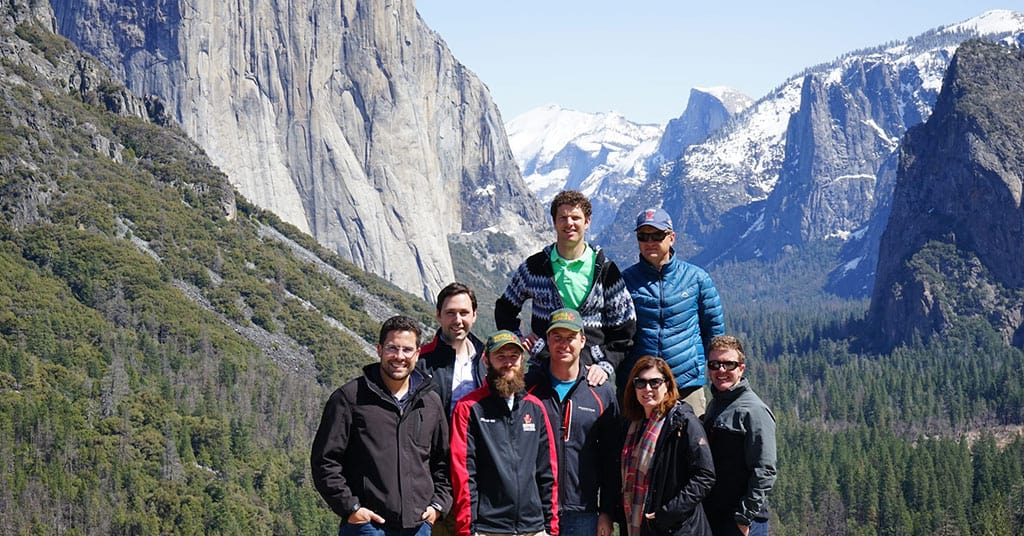
California – Argentina – Chile – Italy – United Kingdom
Hello Nuffield family,
great to be sharing some insights with you all again.
When I last spoke to you at the conclusion of the CSC in Iowa, my reflections centred around New Zealand’s place as a nimble food producer. I felt that our story around our culture, our taonga tuku iho (heritage), our environment, the safety of our food, our nutrition and our manufacturing skill to differentiate were a key strength.
Over the following 40 days, I joined 7 other fantastic scholars from Australia, Zimbabwe, Brazil, UK and The Netherlands to travel through 5 countries. We started in the San Joaquin Valley (The Valley!) of California, then to Buenos Aires and drove through the grain growing heartland to Rosario along the Parana River. We jumped the Andes to Santiago, Chile, starting in the drier north we travelled through horticulture central finishing in the forestry and cropping region around Temuco.
A change in hemisphere and continent bought us to Italy, where we begin our food journey in Turin before driving south via Milan to the mountainous Abruzzo region and then on to the historic city of Rome. Finally, we flew to the UK and started our week on the Fens in Lincolnshire, travelled south to Somerset, around Wessex finishing back in London for a first-hand look at Extinction Rebellions protests at Westminster, London.
Climate
The first common trend across almost every farm or business visit we had is that the climate has changed and growers are struggling to adapt. Primarily the change is expressed as more variable rainfall with much more intensity when it does occur. Only in a few cases were there plans in place to adapt, most are on the back foot with varying degrees of acceptance as to how permanent the change is. Infrastructure to compensate for the changes doesn’t exist in many cases. My conclusion – expect supply volatility everywhere.
GM
Secondly there seems to be two very strong positions around GM, one is accepting and has embraced it fully for production gain. The other is firmly of the opinion that the market doesn’t reward GM, it simply adds yield but no additional profit to the grower and locks the production system into the control of multinationals licensing the tech. My conclusion – GM has not substantially rewarded the grower in most cases I saw.
Biologicals
There are however exciting prospects around the understanding of soil biology and integrated pest management with biologicals. We saw strong recognition that we are just beginning to explore what opportunities exist to improve the biological performance of our soils and reduce our reliance on synthetic chemistries. This is a trend that I don’t think will go away.

Nutrition
The US and South America are firmly focused on feeding the world. Nutrition is becoming a more common word but not ahead of yield yet. Mostly it’s commodity, commodity, commodity. If we produce more, we will win is the mentality. My conclusion – NZ has significant relevance in nutrition, it has limited relevance in competition on supply. It is also clear that manufacturing IP brings nutrition opportunities to the fore. Giving up ownership of manufacturing is at our peril. I saw very limited examples of value chains with grower ownership and control like I see in New Zealand.
There is strong social pressure for sustainable farming practices felt by all growers. This is irrespective of the economy being stable or unstable politically or economically. That surprised me. In most cases from what I have seen the NZ grower seems to be light years ahead in this space with demonstrable data. My conclusion – we can prove our story; many others can only pay lip service. The greatest place the NZ grower can add product value inside the farm gate is through verifiable attributes that sit behind how the product is produced.
Christchurch terror attack
Lastly, we were abroad during the 15th March Christchurch terror event. This afforded us the opportunity to see the response through the eyes of the international community. What shone through during this difficult period was our value in humanity, the moral code that most New Zealanders live by. What I can now reflect on is the way many from around the world view New Zealand. We are deeply respected and admired for doing the right thing because it is simply the right thing to do. Our food is New Zealand food, not New Zealand milk or meat or apples, its New Zealand food. Anytime that any of us interacts with our global customers, we represent all of us.
Values, quality, heritage
For many of you this probably hasn’t been anything overly new, but it really cements for me where we should play and where we shouldn’t as a country and with my own vested interest in the dairy industry. The most successful multi-generational businesses I visited are very clear on their values, absolutely focused on quality, constantly relating what they do to their heritage and are telling the consumer about it. They all have a culture that constitutes excellence, their strategy is an outcome of this culture, they are clear on vision.
It is extraordinarily hard to articulate after one week back in New Zealand what I witnessed in my 8 weeks abroad. But one thing is clear to me. A united New Zealand food story, premised by action not words, vested in a short value chain owned from grower to customer and differentiated through food science based on nutrition, provides us a bright future. Let’s be clear on our why and very smart in our ability to pivot around that.
Kind regards
Corrigan Sowman

Follow Corrigan Sowman on Twitter @gbdairylad
Follow the links below to read the rest of the Global Focus Programme Reports from 2019:

























